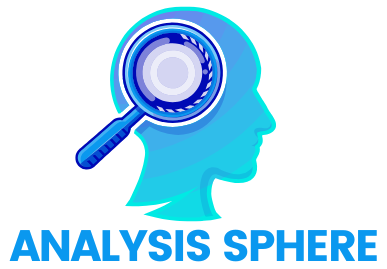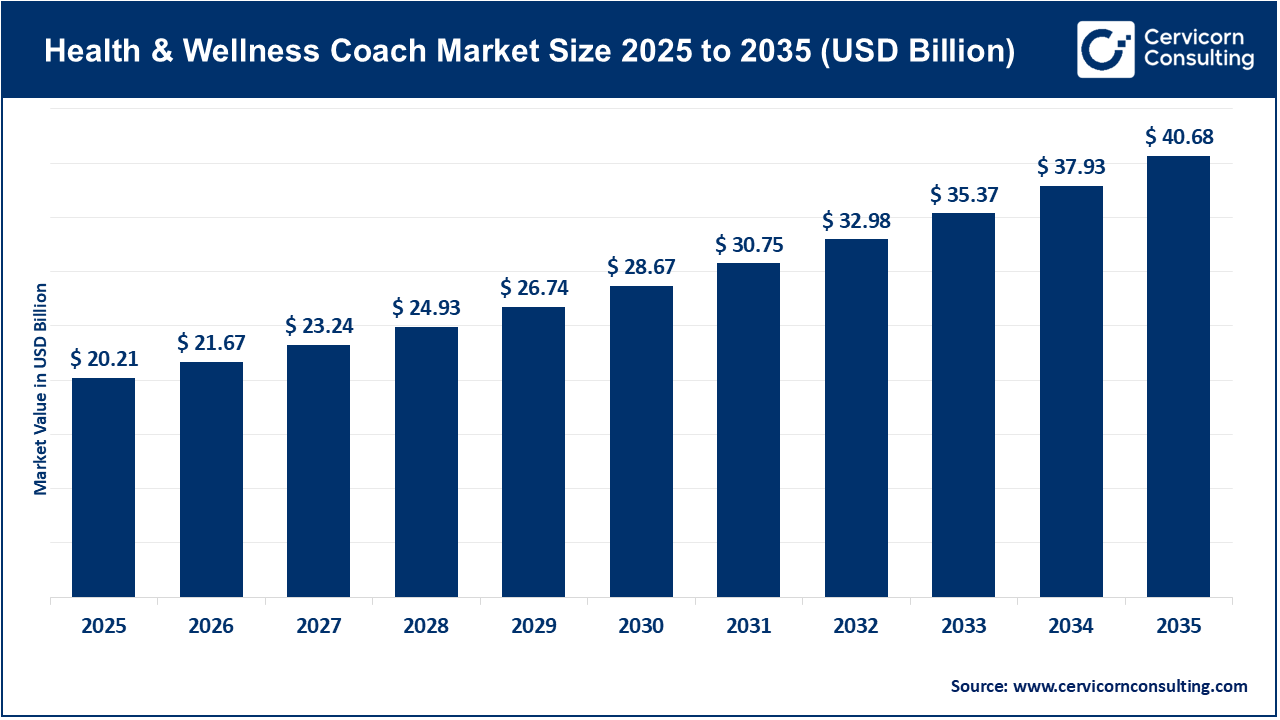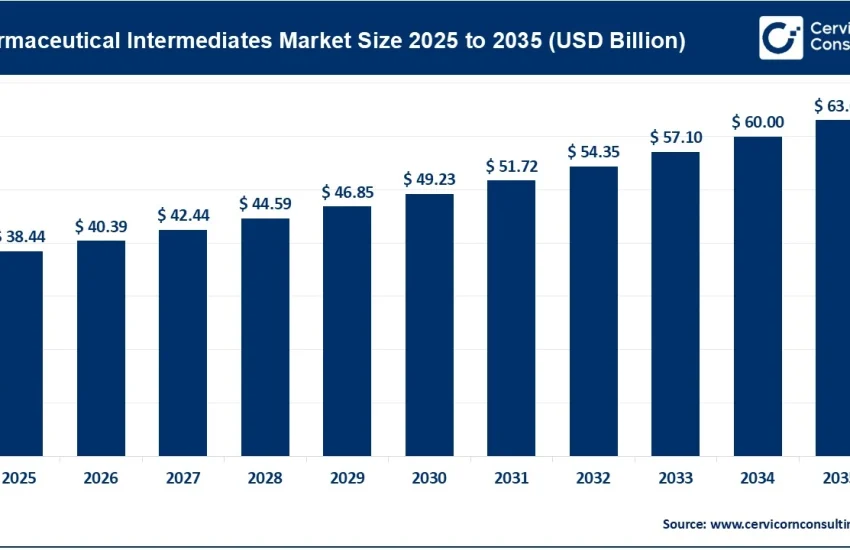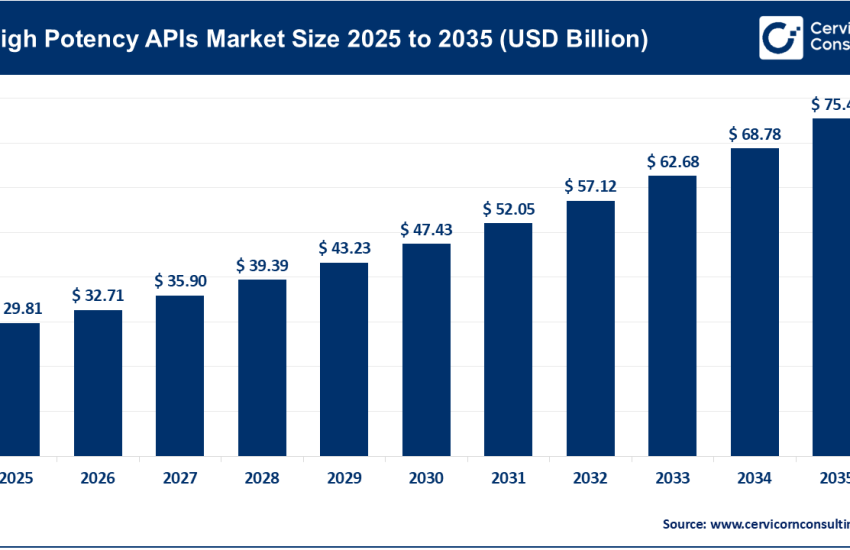Health and Wellness Coach Market Growth Drivers, Trends, Key Players and Regional Insights by 2034
Health and Wellness Coach Market Size
The global health and wellness coach market size was worth USD 20.21 billion in 2025 and is anticipated to expand to around USD 40.68 billion by 2035, registering a compound annual growth rate (CAGR) of 7.25% from 2026 to 2035.
Health and Wellness Coach Market: Growth Factors
The global health and wellness coaching market is witnessing robust growth, driven by a confluence of factors: a rising awareness of preventive healthcare, increasing prevalence of chronic diseases, growing demand for personalized and holistic wellness solutions, widespread adoption of digital and virtual coaching platforms, integration of AI and data-driven tools, and supportive corporate and government wellness initiatives. People increasingly seek behavior-change support, not just reactive care, and health coaches are uniquely positioned to bridge that gap. Meanwhile, employers are investing heavily in coaching as part of their corporate wellness programs to improve productivity, reduce healthcare costs, and retain talent, while governments in many regions are also backing preventive health strategies to curb long-term medical spending.
What Is the Health and Wellness Coach Market?
At its core, the health and wellness coach market refers to the ecosystem of professionals and platforms that offer coaching services aimed at improving an individual’s overall health, well-being, and lifestyle. Unlike medical practitioners, health coaches do not diagnose or prescribe drugs; instead, they guide clients in behavior change — helping with nutrition, exercise, stress management, sleep, mental resilience, chronic disease prevention, and more. Coaching can be delivered via one-on-one sessions, group formats, in-person or virtually, often leveraging digital platforms, apps, wearables, and data analytics.
This market spans several sub-segments: personal wellness coaching, corporate wellness coaching, fitness coaching, nutrition coaching, and stress-management coaching, to name a few. According to industry reports, these services are categorized under applications like corporate wellness programs, weight management, lifestyle management, chronic disease prevention, and mental health.
Get a Free Sample: https://www.cervicornconsulting.com/sample/2814
Why Is It Important?
The health and wellness coach market is important for several interlinked reasons:
- Preventive Healthcare: As healthcare systems globally grapple with high costs, coaching offers a cost-effective way to support preventive behavior change — reducing risk factors such as obesity, diabetes, hypertension, and stress-related illness.
- Personalization: Health coaches deliver tailored interventions that are much more personalized than one-size-fits-all health advice. This pivot toward individualized care meets modern consumers’ expectations.
- Behavior Change: True wellness often depends not just on knowledge but on sustained behavioral changes — coaches help clients set goals, maintain accountability, and internalize lifestyle habits.
- Scalable Wellness: Through digital platforms and AI, health coaching can scale to serve large populations, making wellness accessible beyond affluent or urban consumers.
- Corporate Productivity: Employers benefit through reduced healthcare costs, lower absenteeism, and better employee engagement; coaching also contributes to improved resilience and mental fitness in workforces.
- Mental Wellness Integration: Health coaches increasingly include mental well-being, not just physical fitness, which aligns with a growing global focus on mental health.
Health and Wellness Coach Market: Top Companies
Some leading names in the market include BetterUp, International Academy for Professional Development Ltd, ADVANCED WELLNESS SYSTEMS, LLC, TotalWellness, and Choose Health by Sargent & Associates. Below we profile a few of these and key players.
BetterUp
- Specialization / Key Focus Areas: BetterUp is a global coaching platform that offers professional and personal coaching, combining behavioral science, AI, and human interaction. Its services cover leadership, resilience, mental fitness, sleep, nutrition, parenting, and diversity & inclusion.
- Notable Features: A large, global coach network (3,000+ coaches), multi-language support, AI-driven personalization, analytics, and data-driven insights.
- 2024 Revenue: BetterUp’s reported revenue in 2024 hit US$ 214.6 million.
- Market Share / Positioning: BetterUp is considered a leader in enterprise coaching.
- Global Presence: Headquartered in San Francisco, it has coaches in 70+ countries.
International Academy for Professional Development Ltd (IAPD)
- Specialization: The International Academy for Professional Development Ltd offers certification, training, and development of coaches, including health & wellness coaches.
- Key Focus Areas: Coach education, training curricula, certification programs, and continuing professional development.
- Notable Features: Provides structured coach education that helps maintain standards, professionalism, and ethical practice.
- 2024 Revenue / Market Share: Specific revenue data for IAPD in wellness coaching isn’t publicly disclosed; it’s primarily a training and education institution, not a direct coaching service provider.
- Global Presence: Offers programs worldwide, with a network of coaches trained across various countries.
Advanced Wellness Systems, LLC
- Specialization: A wellness coaching organization that provides health coaching, wellness consulting, and corporate wellness solutions.
- Key Focus Areas: Behavioral change, health risk assessments, wellness program design, coaching for lifestyle modification.
- Notable Features: Expertise in system-level wellness, offering both individual and group coaching, along with wellness program infrastructure.
- 2024 Revenue / Market Share: Detailed public figures are limited; as a private LLC, its financial disclosures are not widely available.
- Global Presence: Primarily U.S.-based, though it may work with corporate clients beyond.
TotalWellness
- Specialization: A corporate wellness provider, offering comprehensive wellness solutions including health coaching, preventive care, and wellness program management.
- Key Focus Areas: Employee wellness, health coaching, preventive health services, risk management.
- Notable Features: Combines coaching with wellness administration, analytics, health risk assessments, and program deployment for companies.
- 2024 Revenue / Market Share: Precise 2024 wellness coaching revenue not publicly available; operates in the corporate wellness space where health coaching is part of broader wellness services.
- Global Presence: Primarily U.S.-centric, serving companies with wellness programs in America.
Choose Health by Sargent & Associates
- Specialization: Wellness coaching and consultancy, possibly with tailored coaching interventions for lifestyle, health, and behavioral change.
- Key Focus Areas: Nutrition, stress management, holistic wellness, behavior change coaching.
- Notable Features: As a specialized boutique or consultancy, likely emphasizes personalized, high-touch coaching.
- 2024 Revenue / Market Share: Not publicly disclosed; likely smaller scale compared to global digital platforms.
- Global Presence: May operate primarily in certain geographies; publicly available info is limited.
Leading Trends and Their Impact
Several major trends are shaping the health and wellness coach market, with profound implications:
- Digital and Virtual Coaching: The shift to online platforms is perhaps the most transformative. Digital coaching enables remote, scalable access, making health coaching available to people regardless of location.
- AI and Data Analytics: Coaches increasingly use artificial intelligence, predictive analytics, and real-time data (through wearables, biosensors) to personalize interventions, predict risk, and provide timely, adaptive guidance.
- Holistic Wellness Approach: Rather than focusing solely on physical health or weight loss, coaching is becoming more holistic — integrating mental health, resilience, sleep, nutrition, and emotional well-being.
- Corporate Wellness Integration: Companies are embedding health coaching in their wellness programs to boost employee health, reduce healthcare costs, and drive productivity.
- Regulation and Certification: With rising demand, there’s also increased focus on standards, accreditation, and ethical training for coaches to ensure credibility.
- AI-Augmented Coaching: Generative AI is emerging as a tool to augment human coaches — helping with administrative tasks, content generation, but not replacing the relational and interpretative aspects of coaching.
These trends are not just reshaping how coaching is delivered — they are redefining who can access coaching, how coaches work, and how effective coaching can be.
Successful Examples Around the World
- BetterUp (Global): BetterUp’s model of combining AI, behavioral science, and human coaching has enabled enterprises such as Hilton, NASA, Chevron, and Snap Inc. to embed coaching deeply into employee wellness programs.
- NHS Health Coaching (UK): In the UK, the National Health Service has increasingly incorporated health coaches into its system to support chronic disease management, lifestyle change, and community-based preventive care.
- Corporate Coaching in Asia-Pacific: In fast-growing economies such as India and China, digital coaching platforms are gaining traction, riding rising health awareness and digital penetration.
- Chronic Disease Coaching in the U.S.: Many health insurers and digital health companies use coaching to manage chronic conditions, helping patients adhere to treatment plans, maintain lifestyle changes, and reduce long-term health costs.
Global & Regional Analysis: Government Initiatives and Policies
North America
- Market Dominance: North America (especially the U.S.) holds a significant share of the coaching market, supported by high healthcare costs, chronic disease prevalence, and corporate wellness investments.
- Government & Policy Support: While there is no unified “health coach” regulation in the U.S., there is increasing support for preventive care and wellness programs. Employers often collaborate with coaching vendors to reduce healthcare spending and improve health outcomes.
- Regulatory Challenges: Concerns about coach qualifications, certification, and lack of regulation persist.
Europe
- Growing Adoption: European countries, with their strong public healthcare systems, are seeing growth in coaching as part of preventive health strategies.
- Digital Health Reimbursement: In some countries, digital coaching and telehealth are increasingly integrated into covered health services or wellness programs.
- Certification & Professionalization: European wellness and coaching associations emphasize rigorous coach training, aligning with broader efforts to professionalize coaching and integrate it into healthcare ecosystems.
Asia-Pacific
- Fastest Growth: Asia-Pacific is among the fastest-growing regions for health and wellness coaching.
- Government Initiatives: Countries like India and China are promoting digital health and preventive wellness through national policies, increasing digital health infrastructure, and encouraging public-private partnerships.
- Emerging Players: Local startups and global coaching platforms are expanding aggressively, leveraging mobile technology and wellness awareness in emerging markets.
Latin America, Middle East & Africa
- Emerging Potential: These regions are showing rising interest in wellness coaching, especially among middle- and high-income segments.
- Policy Drivers: Government-led public health campaigns, wellness tourism, and adoption of preventive health models could catalyze coaching demand.
- Challenges: Barriers include low regulatory frameworks, limited coach training infrastructure, and lower digital adoption in some populations.
Challenges and Risks
- Lack of Standard Regulation: There is no unified global accreditation for health coaches, raising issues about coach quality, ethical standards, and consumer protection.
- Data Privacy and Security: As coaching platforms collect sensitive personal health data, data security and privacy pose critical risks.
- Scalability vs. Quality: Scaling coaching may dilute the personalized, relational quality that makes coaching effective.
- Affordability & Access: While digital platforms expand reach, cost remains a barrier for many.
- Skepticism & Misconceptions: Some potential clients still confuse coaching with therapy or may doubt its efficacy, needing more evidence-based validation.
To Wrap Up
The health and wellness coach market sits at the intersection of preventive health, behavioral science, and digital innovation. Fueled by growing demand for personalized wellness, corporate investment, and technological tools, the market is expanding rapidly across geographies. Key players like BetterUp are scaling globally with strong revenues, while training institutions like the International Academy for Professional Development ensure there are qualified professionals to meet demand.
At the same time, trends such as AI augmentation, holistic wellness strategies, and digital delivery are reshaping the ecosystem. Governments, too, are playing a vital role — especially in regions where preventive care and digital health are policy priorities. Yet, as the market grows, it must navigate challenges around regulation, data security, coach quality, and equitable access.
To Get Detailed Overview, Contact Us: https://www.cervicornconsulting.com/contact-us
Read Report: Boat-to-Grid Electrical Energy Storage Market Growth Drivers, Trends, Key Players and Regional Insights by 2034



